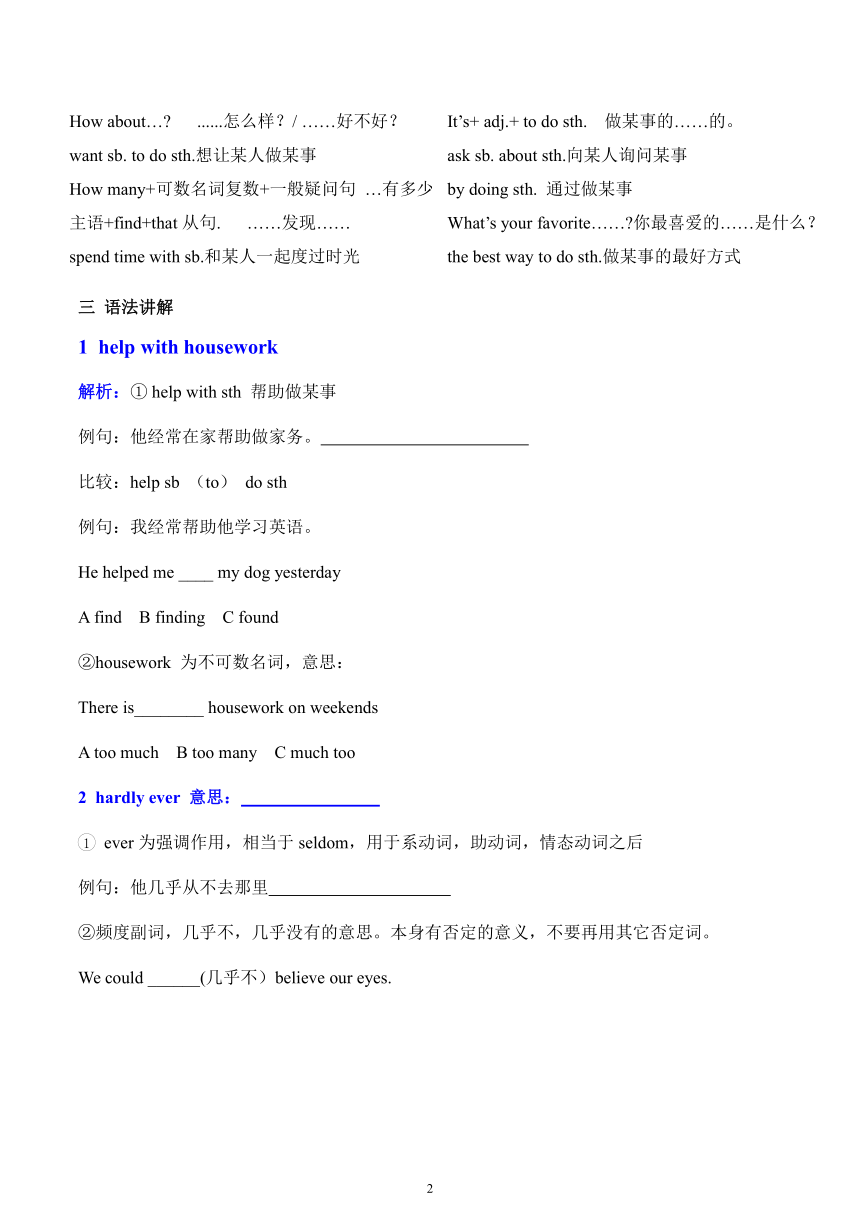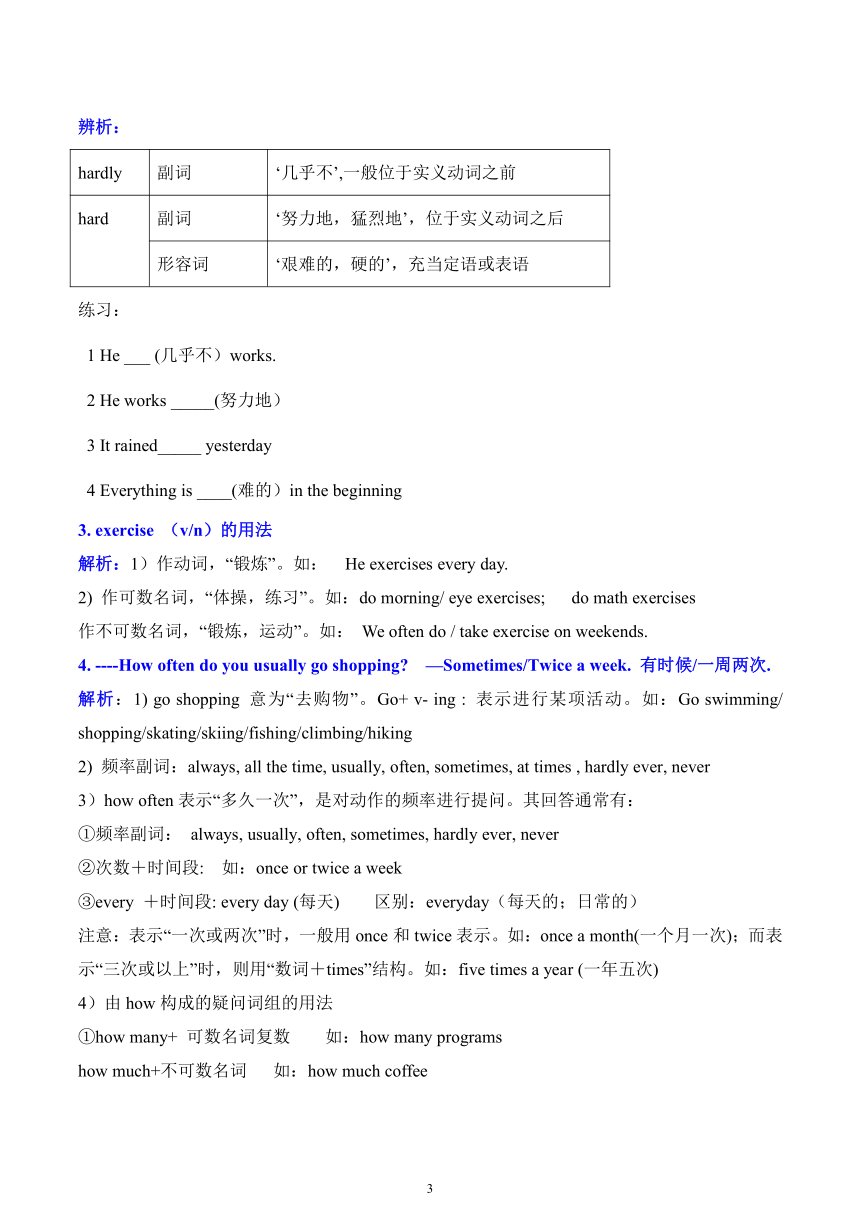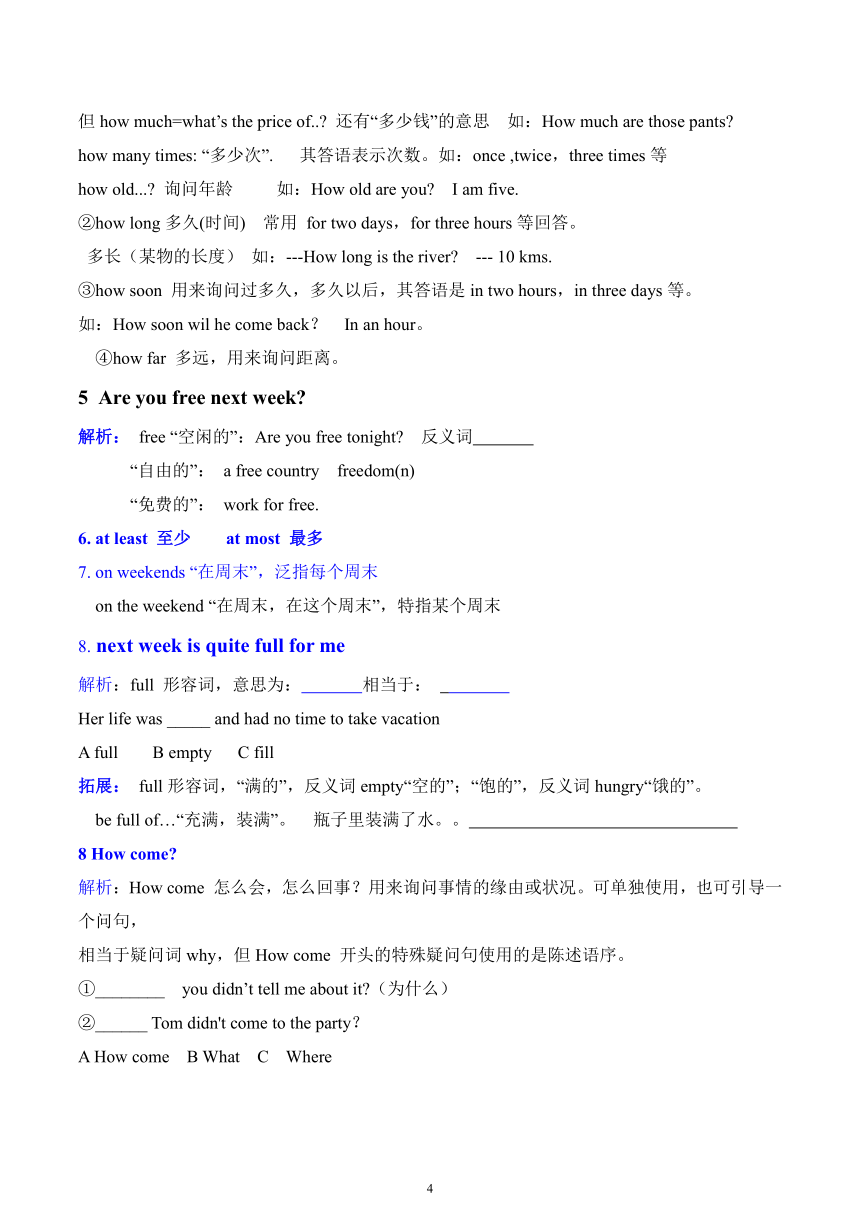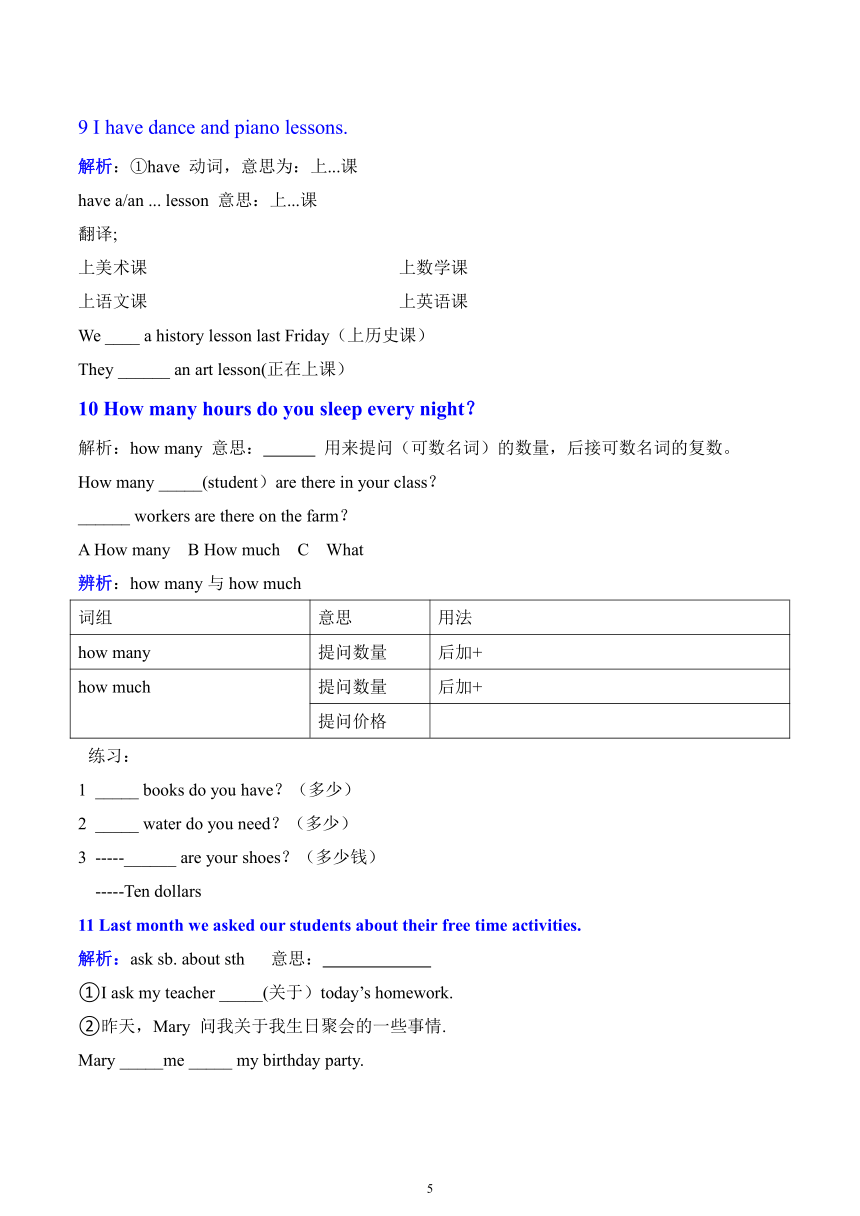Unit 2 How often do you exercise?知识清单 (无答案)
文档属性
| 名称 | Unit 2 How often do you exercise?知识清单 (无答案) |  | |
| 格式 | doc | ||
| 文件大小 | 112.5KB | ||
| 资源类型 | 教案 | ||
| 版本资源 | 人教新目标(Go for it)版 | ||
| 科目 | 英语 | ||
| 更新时间 | 2024-01-06 13:26:36 | ||
图片预览





文档简介
Unit 2 How often do you exercise
一基础单词回顾
家务劳动,家务事 n. 几乎,几乎没有 adv.
一次,曾经 adv. 两次,两倍 adv.
忙的,满的,充满的 adj. 大概,或许,可能adv.
最小,最少adv.最小的,最少的 adj.& pron.
结果,后果 n. 百分之…n.
虽然,尽管,即使 conj. 以,凭借,穿过 prep.
在一起,共同 adv. 消失,灭亡,死亡 v.
这样的,那样的,类似的 adv.& pron.
牙科医生 n. 杂志 n.
然而,不过adv. 比 prep.& conj.
没有一个,毫无 pron.
较少,较小 adv. 较少的,较小的 adj.& pron.
二 短语归纳
help with housework帮助做家务
on weekends在周末
how often多久一次
hardly ever几乎从不
once a week每周一次
twice a month每月两次
every day每天
be free有空
go to the movies去看电影
use the Internet用互联网
swing dance摇摆舞
play tennis打网球
stay up late熬夜;睡得很晚
at least至少
have dance and piano lessons上舞蹈课和钢琴课
go to bed early早点睡觉
play sports进行体育活动
be good for对……有好处
go camping去野营
not…at all一点儿也不……
in one’s free time在某人的业余时间
the most popular最受欢迎的
such as比如;诸如
old habits die hard积习难改
go to the dentist去看牙医
morn than多于;超过
less than少于
help sb. with sth.帮助某人做某事
How about… ......怎么样?/ ……好不好?
want sb. to do sth.想让某人做某事
How many+可数名词复数+一般疑问句 …有多少
主语+find+that从句. ……发现……
spend time with sb.和某人一起度过时光
It’s+ adj.+ to do sth. 做某事的……的。
ask sb. about sth.向某人询问某事
by doing sth. 通过做某事
What’s your favorite…… 你最喜爱的……是什么?
the best way to do sth.做某事的最好方式
三 语法讲解
help with housework
解析:① help with sth 帮助做某事
例句:他经常在家帮助做家务。
比较:help sb (to) do sth
例句:我经常帮助他学习英语。
He helped me ____ my dog yesterday
A find B finding C found
②housework 为不可数名词,意思:
There is________ housework on weekends
A too much B too many C much too
hardly ever 意思:
ever为强调作用,相当于seldom,用于系动词,助动词,情态动词之后
例句:他几乎从不去那里
②频度副词,几乎不,几乎没有的意思。本身有否定的意义,不要再用其它否定词。
We could ______(几乎不)believe our eyes.
辨析:
hardly 副词 ‘几乎不’,一般位于实义动词之前
hard 副词 ‘努力地,猛烈地’,位于实义动词之后
形容词 ‘艰难的,硬的’,充当定语或表语
练习:
1 He ___ (几乎不)works.
2 He works _____(努力地)
3 It rained_____ yesterday
4 Everything is ____(难的)in the beginning
3. exercise (v/n)的用法
解析:1)作动词,“锻炼”。如: He exercises every day.
2) 作可数名词,“体操,练习”。如:do morning/ eye exercises; do math exercises
作不可数名词,“锻炼,运动”。如: We often do / take exercise on weekends.
4. ----How often do you usually go shopping —Sometimes/Twice a week. 有时候/一周两次.
解析:1) go shopping 意为“去购物”。Go+ v- ing : 表示进行某项活动。如:Go swimming/ shopping/skating/skiing/fishing/climbing/hiking
2) 频率副词:always, all the time, usually, often, sometimes, at times , hardly ever, never
3)how often表示“多久一次”,是对动作的频率进行提问。其回答通常有:
①频率副词: always, usually, often, sometimes, hardly ever, never
②次数+时间段: 如:once or twice a week
③every +时间段: every day (每天) 区别:everyday(每天的;日常的)
注意:表示“一次或两次”时,一般用once和twice表示。如:once a month(一个月一次);而表示“三次或以上”时,则用“数词+times”结构。如:five times a year (一年五次)
4)由how构成的疑问词组的用法
①how many+ 可数名词复数 如:how many programs
how much+不可数名词 如:how much coffee
但how much=what’s the price of.. 还有“多少钱”的意思 如:How much are those pants
how many times: “多少次”. 其答语表示次数。如:once ,twice,three times等
how old... 询问年龄 如:How old are you I am five.
②how long多久(时间) 常用 for two days,for three hours等回答。
多长(某物的长度) 如:---How long is the river --- 10 kms.
③how soon 用来询问过多久,多久以后,其答语是in two hours,in three days等。
如:How soon wil he come back? In an hour。
④how far 多远,用来询问距离。
Are you free next week
解析: free “空闲的”:Are you free tonight 反义词
“自由的”: a free country freedom(n)
“免费的”: work for free.
6. at least 至少 at most 最多
7. on weekends “在周末”,泛指每个周末
on the weekend “在周末,在这个周末”,特指某个周末
8. next week is quite full for me
解析:full 形容词,意思为: 相当于:
Her life was _____ and had no time to take vacation
A full B empty C fill
拓展: full形容词,“满的”,反义词empty“空的”;“饱的”,反义词hungry“饿的”。
be full of…“充满,装满”。 瓶子里装满了水。。
8 How come
解析:How come 怎么会,怎么回事?用来询问事情的缘由或状况。可单独使用,也可引导一个问句,
相当于疑问词why,但How come 开头的特殊疑问句使用的是陈述语序。
①________ you didn’t tell me about it (为什么)
②______ Tom didn't come to the party?
A How come B What C Where
9 I have dance and piano lessons.
解析:①have 动词,意思为:上...课
have a/an ... lesson 意思:上...课
翻译;
上美术课 上数学课
上语文课 上英语课
We ____ a history lesson last Friday(上历史课)
They ______ an art lesson(正在上课)
10 How many hours do you sleep every night?
解析:how many 意思: 用来提问(可数名词)的数量,后接可数名词的复数。
How many _____(student)are there in your class?
______ workers are there on the farm?
A How many B How much C What
辨析:how many与how much
词组 意思 用法
how many 提问数量 后加+
how much 提问数量 后加+
提问价格
练习:
_____ books do you have?(多少)
_____ water do you need?(多少)
-----______ are your shoes?(多少钱)
-----Ten dollars
11 Last month we asked our students about their free time activities.
解析:ask sb. about sth 意思:
①I ask my teacher _____(关于)today’s homework.
②昨天,Mary 问我关于我生日聚会的一些事情.
Mary _____me _____ my birthday party.
拓展:ask sb. to do : 叫…做某事 The teacher asked me to clean the classroom.
ask sb. not to do sth.: 叫…不要做某事 The teacher asked me not to clean the classroom.
ask sb. about sth. 问某人某事 We asked our students about their free time activities.
ask sb. for sth. 向某人要某物 ask the teacher for help
12.She says it’s good for my health. 她说那对我的健康有益。
(1)be good for:“对……有好处”。锻炼有益身体健康。 .
(2)be good at:“擅长于……”。 他擅长弹钢琴。 .
(3)be good to sb./sth: “对……好”。这个老人对我很好。 .
(4)be good with: “擅于应对/应付…”。 老师擅于应对学生。 .
13.go online = use the Internet上网
解析:其中online为副词,意为“在线,联网的”,还可用作形容词,意为“在线的,联网的”。online games“在线游戏”
use“使用,运用”。use sth to do sth.“用某物做某事”。我用刀切苹果。 .
14 Here are the results.
解析:Here be 意思:这儿有...这是...,
be 动词取决于名词的情况,名词为可数名词单数或不可数名词,用is或was
名词为可数名词复数,用are或were
Here ____ your jacket. 这是你的夹克
Here ____ some flowers for you. 这有你的花
Here____ a letter for you 这里有你一封信
Here___ some water for you.
surprise (n) “惊讶”
解析:to one’s surprise 令某人惊讶的是 in surprise 惊讶地
(v) “使惊奇、意外”be surprised at sth.对… 感到意外be surprised to do sth. 惊讶做某事 如:I was surprised at the news = I was surprised to hear the news.
16. We found that only fifteen percent of our students exercise every day.
解析:①find 动词,意思: 过去式为
本句为:find that+宾语从句的结构
他发现没人能回答他的问题
He found that no one could _____ his question.(回答)
I found that the job was ______(有趣的)
②percent 名词,意思: 没有复数形式,主要有基数词+percent构成百分数,
如40% 50%
若百分数做主语,若修饰的名词为复数,则谓语动词用复数; 若修饰的名词为单数或不可数名词,则谓语动词用单数
例:
Forty percent of the students on our class_____(be) girls.
Fifty percent of water____(be) used(使用.
17 The answers to our questions about watching TV were also interesting.
the answer ___ our questions 意思:
解析:to 此处为介词,意思为属于,
类似短语:
the key ___ the door.
the solution ___ the problem
Can you find out the answers ____ the questions?
A for B to C with
18 Although many students like to watch sports,game shows are the most popular.
解析:①although 连词,意思: 用来引导让步状语从句。同义词为:though
____ my grandpa is old,____ looks very strong and healthy.
A Although but B Although 不填 C Although so
She kept on _____, ____ she was tired
A work 不填 B working although C to work although
注意:
在汉语中,我们常将虽然与但是连用,但在英语中although/though 与but 不能同时出现一个句子中.
_____ my cousin is very young,___ she can help with the housework
A Once,不填 B Though,but C Though,不填
19. maybe (adv): 也许,大概 (Maybe) he (maybe) knows it.
May + v(原):也许,大概 He may know it.
如:Maybe he is at home.= He maybe is at home.= He may be at home.
20 It is good to relax by using the Internet or watching game shows,but we think the best way to relax is through exercise.
解析:①It’s+形容词+to do sth 做某事....是....的。
It is important ____ (listen)to the teacher carefully.
It is easy for us ____(swim)
It is not good for animals ___(stay)in cages(笼子)
It is hard for him___(study) English.
② the best way to do sth 意思:
The best way ____(keep)health is having good habits
The best way ____(learn)English is reading more
What is the best way __(learn)Chinese?
③through 介词,意思:
I got the news _____(通过)my uncle
He got the job _____(通过)his friend
④by+v-ing“通过… 方式”
拓展:
through(从内部)穿过。她独自一人穿过森林。
across (从物体表面)横过。他小心地走过马路。
over (从某物上方)越过。一架飞机飞过了房子。
We went through the forest at last.
21 Exercise such as playing sports is fun, and you can spend time with your friends and family as you play together.
解析:①such as 意思: 用来列举人或事物的几个例子.
I have a lot of hobbies,___ ____ reading and singing
②spend 及物动词,意思为度过。 spend time with sb. 意思:
I spent the weekend____ my family.
A with B to C about
拓展:
spend 还可表示花费(时间,金钱)
spend ....on.... 花费时间或金钱在某方面
I spent 5 dollars on this book.
spend...doing sth 花费时间或金钱做某事
Don’t spend too much time____(watch) TV.
③together 副词,在一起,共同,together with... 和...一块
Mary together with his friends ____(go) to the beach for vacation every year
22. Old habits die hard. 恶习难改.
die(v) 死亡;消失
death(n) 死亡;
dead(adj) 死的;
dying(adj) 垂死的;临终的;(植)枯萎的 dying wish----遗言
23. mind “头脑,心智”。Mind and body are closely related.
24. none “毫无,没有一个”
①既可指人,也可指物。
②可单独使用,也可和of连用,后跟不可数名词或可数名词复数。
③noneof与不可数名词连用作主语时,谓语动词用单数;与可数名词复数连用作主语时,谓语动词用单、复数均可。
④用于回答以howmany或howmuch开头的问句。
no one “没有人”①只能指人,不能指物。
②一般单独使用、不和of连用。
③作主语时,谓语动词用单数。
④用于回答以who开头的问句
我们没人去过公园。
没人想离开。
How many birds can you see
Who likes that place
25 However,she has some bad habits,too
however, 副词,意思: 可以位于句首,句中和句末,
通常用逗号与句子其它部分隔开。
例句:
She was ill, ____she still went to work.
A but B so C because
His brother,_____, had other ideas.
A but B however C so
It began to rain. ______, we went out to look for the boy
A But B However C Because
He likes sports, _____ his wife likes music.
A but B with C to
26 She usually watches TV for more than two hours
more than 意思: 相当于: 反义词组:
I lived in Tai’an for __________(十多年)
There are_______(20多个)students in our class.
Here_____ (be) more than 20 books for you.
27 She says she is afraid.
afraid 形容词,意思: 一般做表语,不用在名词前做定语。
be afraid to do sth 意思:
I afraid _____(travel) by plane
be afraid of sb. sth 意思:
be afraid of doin sth 意思:
Some children are afraid _____the dark.
Don’t be afraid of _____(ask) questions.
I’m afraid (that)+从句 意思:恐怕,担心
I’m afraid I have to go now. 恐怕现在我得走了
28. point 名词,“得分”;动词,“指,指向”
一基础单词回顾
家务劳动,家务事 n. 几乎,几乎没有 adv.
一次,曾经 adv. 两次,两倍 adv.
忙的,满的,充满的 adj. 大概,或许,可能adv.
最小,最少adv.最小的,最少的 adj.& pron.
结果,后果 n. 百分之…n.
虽然,尽管,即使 conj. 以,凭借,穿过 prep.
在一起,共同 adv. 消失,灭亡,死亡 v.
这样的,那样的,类似的 adv.& pron.
牙科医生 n. 杂志 n.
然而,不过adv. 比 prep.& conj.
没有一个,毫无 pron.
较少,较小 adv. 较少的,较小的 adj.& pron.
二 短语归纳
help with housework帮助做家务
on weekends在周末
how often多久一次
hardly ever几乎从不
once a week每周一次
twice a month每月两次
every day每天
be free有空
go to the movies去看电影
use the Internet用互联网
swing dance摇摆舞
play tennis打网球
stay up late熬夜;睡得很晚
at least至少
have dance and piano lessons上舞蹈课和钢琴课
go to bed early早点睡觉
play sports进行体育活动
be good for对……有好处
go camping去野营
not…at all一点儿也不……
in one’s free time在某人的业余时间
the most popular最受欢迎的
such as比如;诸如
old habits die hard积习难改
go to the dentist去看牙医
morn than多于;超过
less than少于
help sb. with sth.帮助某人做某事
How about… ......怎么样?/ ……好不好?
want sb. to do sth.想让某人做某事
How many+可数名词复数+一般疑问句 …有多少
主语+find+that从句. ……发现……
spend time with sb.和某人一起度过时光
It’s+ adj.+ to do sth. 做某事的……的。
ask sb. about sth.向某人询问某事
by doing sth. 通过做某事
What’s your favorite…… 你最喜爱的……是什么?
the best way to do sth.做某事的最好方式
三 语法讲解
help with housework
解析:① help with sth 帮助做某事
例句:他经常在家帮助做家务。
比较:help sb (to) do sth
例句:我经常帮助他学习英语。
He helped me ____ my dog yesterday
A find B finding C found
②housework 为不可数名词,意思:
There is________ housework on weekends
A too much B too many C much too
hardly ever 意思:
ever为强调作用,相当于seldom,用于系动词,助动词,情态动词之后
例句:他几乎从不去那里
②频度副词,几乎不,几乎没有的意思。本身有否定的意义,不要再用其它否定词。
We could ______(几乎不)believe our eyes.
辨析:
hardly 副词 ‘几乎不’,一般位于实义动词之前
hard 副词 ‘努力地,猛烈地’,位于实义动词之后
形容词 ‘艰难的,硬的’,充当定语或表语
练习:
1 He ___ (几乎不)works.
2 He works _____(努力地)
3 It rained_____ yesterday
4 Everything is ____(难的)in the beginning
3. exercise (v/n)的用法
解析:1)作动词,“锻炼”。如: He exercises every day.
2) 作可数名词,“体操,练习”。如:do morning/ eye exercises; do math exercises
作不可数名词,“锻炼,运动”。如: We often do / take exercise on weekends.
4. ----How often do you usually go shopping —Sometimes/Twice a week. 有时候/一周两次.
解析:1) go shopping 意为“去购物”。Go+ v- ing : 表示进行某项活动。如:Go swimming/ shopping/skating/skiing/fishing/climbing/hiking
2) 频率副词:always, all the time, usually, often, sometimes, at times , hardly ever, never
3)how often表示“多久一次”,是对动作的频率进行提问。其回答通常有:
①频率副词: always, usually, often, sometimes, hardly ever, never
②次数+时间段: 如:once or twice a week
③every +时间段: every day (每天) 区别:everyday(每天的;日常的)
注意:表示“一次或两次”时,一般用once和twice表示。如:once a month(一个月一次);而表示“三次或以上”时,则用“数词+times”结构。如:five times a year (一年五次)
4)由how构成的疑问词组的用法
①how many+ 可数名词复数 如:how many programs
how much+不可数名词 如:how much coffee
但how much=what’s the price of.. 还有“多少钱”的意思 如:How much are those pants
how many times: “多少次”. 其答语表示次数。如:once ,twice,three times等
how old... 询问年龄 如:How old are you I am five.
②how long多久(时间) 常用 for two days,for three hours等回答。
多长(某物的长度) 如:---How long is the river --- 10 kms.
③how soon 用来询问过多久,多久以后,其答语是in two hours,in three days等。
如:How soon wil he come back? In an hour。
④how far 多远,用来询问距离。
Are you free next week
解析: free “空闲的”:Are you free tonight 反义词
“自由的”: a free country freedom(n)
“免费的”: work for free.
6. at least 至少 at most 最多
7. on weekends “在周末”,泛指每个周末
on the weekend “在周末,在这个周末”,特指某个周末
8. next week is quite full for me
解析:full 形容词,意思为: 相当于:
Her life was _____ and had no time to take vacation
A full B empty C fill
拓展: full形容词,“满的”,反义词empty“空的”;“饱的”,反义词hungry“饿的”。
be full of…“充满,装满”。 瓶子里装满了水。。
8 How come
解析:How come 怎么会,怎么回事?用来询问事情的缘由或状况。可单独使用,也可引导一个问句,
相当于疑问词why,但How come 开头的特殊疑问句使用的是陈述语序。
①________ you didn’t tell me about it (为什么)
②______ Tom didn't come to the party?
A How come B What C Where
9 I have dance and piano lessons.
解析:①have 动词,意思为:上...课
have a/an ... lesson 意思:上...课
翻译;
上美术课 上数学课
上语文课 上英语课
We ____ a history lesson last Friday(上历史课)
They ______ an art lesson(正在上课)
10 How many hours do you sleep every night?
解析:how many 意思: 用来提问(可数名词)的数量,后接可数名词的复数。
How many _____(student)are there in your class?
______ workers are there on the farm?
A How many B How much C What
辨析:how many与how much
词组 意思 用法
how many 提问数量 后加+
how much 提问数量 后加+
提问价格
练习:
_____ books do you have?(多少)
_____ water do you need?(多少)
-----______ are your shoes?(多少钱)
-----Ten dollars
11 Last month we asked our students about their free time activities.
解析:ask sb. about sth 意思:
①I ask my teacher _____(关于)today’s homework.
②昨天,Mary 问我关于我生日聚会的一些事情.
Mary _____me _____ my birthday party.
拓展:ask sb. to do : 叫…做某事 The teacher asked me to clean the classroom.
ask sb. not to do sth.: 叫…不要做某事 The teacher asked me not to clean the classroom.
ask sb. about sth. 问某人某事 We asked our students about their free time activities.
ask sb. for sth. 向某人要某物 ask the teacher for help
12.She says it’s good for my health. 她说那对我的健康有益。
(1)be good for:“对……有好处”。锻炼有益身体健康。 .
(2)be good at:“擅长于……”。 他擅长弹钢琴。 .
(3)be good to sb./sth: “对……好”。这个老人对我很好。 .
(4)be good with: “擅于应对/应付…”。 老师擅于应对学生。 .
13.go online = use the Internet上网
解析:其中online为副词,意为“在线,联网的”,还可用作形容词,意为“在线的,联网的”。online games“在线游戏”
use“使用,运用”。use sth to do sth.“用某物做某事”。我用刀切苹果。 .
14 Here are the results.
解析:Here be 意思:这儿有...这是...,
be 动词取决于名词的情况,名词为可数名词单数或不可数名词,用is或was
名词为可数名词复数,用are或were
Here ____ your jacket. 这是你的夹克
Here ____ some flowers for you. 这有你的花
Here____ a letter for you 这里有你一封信
Here___ some water for you.
surprise (n) “惊讶”
解析:to one’s surprise 令某人惊讶的是 in surprise 惊讶地
(v) “使惊奇、意外”be surprised at sth.对… 感到意外be surprised to do sth. 惊讶做某事 如:I was surprised at the news = I was surprised to hear the news.
16. We found that only fifteen percent of our students exercise every day.
解析:①find 动词,意思: 过去式为
本句为:find that+宾语从句的结构
他发现没人能回答他的问题
He found that no one could _____ his question.(回答)
I found that the job was ______(有趣的)
②percent 名词,意思: 没有复数形式,主要有基数词+percent构成百分数,
如40% 50%
若百分数做主语,若修饰的名词为复数,则谓语动词用复数; 若修饰的名词为单数或不可数名词,则谓语动词用单数
例:
Forty percent of the students on our class_____(be) girls.
Fifty percent of water____(be) used(使用.
17 The answers to our questions about watching TV were also interesting.
the answer ___ our questions 意思:
解析:to 此处为介词,意思为属于,
类似短语:
the key ___ the door.
the solution ___ the problem
Can you find out the answers ____ the questions?
A for B to C with
18 Although many students like to watch sports,game shows are the most popular.
解析:①although 连词,意思: 用来引导让步状语从句。同义词为:though
____ my grandpa is old,____ looks very strong and healthy.
A Although but B Although 不填 C Although so
She kept on _____, ____ she was tired
A work 不填 B working although C to work although
注意:
在汉语中,我们常将虽然与但是连用,但在英语中although/though 与but 不能同时出现一个句子中.
_____ my cousin is very young,___ she can help with the housework
A Once,不填 B Though,but C Though,不填
19. maybe (adv): 也许,大概 (Maybe) he (maybe) knows it.
May + v(原):也许,大概 He may know it.
如:Maybe he is at home.= He maybe is at home.= He may be at home.
20 It is good to relax by using the Internet or watching game shows,but we think the best way to relax is through exercise.
解析:①It’s+形容词+to do sth 做某事....是....的。
It is important ____ (listen)to the teacher carefully.
It is easy for us ____(swim)
It is not good for animals ___(stay)in cages(笼子)
It is hard for him___(study) English.
② the best way to do sth 意思:
The best way ____(keep)health is having good habits
The best way ____(learn)English is reading more
What is the best way __(learn)Chinese?
③through 介词,意思:
I got the news _____(通过)my uncle
He got the job _____(通过)his friend
④by+v-ing“通过… 方式”
拓展:
through(从内部)穿过。她独自一人穿过森林。
across (从物体表面)横过。他小心地走过马路。
over (从某物上方)越过。一架飞机飞过了房子。
We went through the forest at last.
21 Exercise such as playing sports is fun, and you can spend time with your friends and family as you play together.
解析:①such as 意思: 用来列举人或事物的几个例子.
I have a lot of hobbies,___ ____ reading and singing
②spend 及物动词,意思为度过。 spend time with sb. 意思:
I spent the weekend____ my family.
A with B to C about
拓展:
spend 还可表示花费(时间,金钱)
spend ....on.... 花费时间或金钱在某方面
I spent 5 dollars on this book.
spend...doing sth 花费时间或金钱做某事
Don’t spend too much time____(watch) TV.
③together 副词,在一起,共同,together with... 和...一块
Mary together with his friends ____(go) to the beach for vacation every year
22. Old habits die hard. 恶习难改.
die(v) 死亡;消失
death(n) 死亡;
dead(adj) 死的;
dying(adj) 垂死的;临终的;(植)枯萎的 dying wish----遗言
23. mind “头脑,心智”。Mind and body are closely related.
24. none “毫无,没有一个”
①既可指人,也可指物。
②可单独使用,也可和of连用,后跟不可数名词或可数名词复数。
③noneof与不可数名词连用作主语时,谓语动词用单数;与可数名词复数连用作主语时,谓语动词用单、复数均可。
④用于回答以howmany或howmuch开头的问句。
no one “没有人”①只能指人,不能指物。
②一般单独使用、不和of连用。
③作主语时,谓语动词用单数。
④用于回答以who开头的问句
我们没人去过公园。
没人想离开。
How many birds can you see
Who likes that place
25 However,she has some bad habits,too
however, 副词,意思: 可以位于句首,句中和句末,
通常用逗号与句子其它部分隔开。
例句:
She was ill, ____she still went to work.
A but B so C because
His brother,_____, had other ideas.
A but B however C so
It began to rain. ______, we went out to look for the boy
A But B However C Because
He likes sports, _____ his wife likes music.
A but B with C to
26 She usually watches TV for more than two hours
more than 意思: 相当于: 反义词组:
I lived in Tai’an for __________(十多年)
There are_______(20多个)students in our class.
Here_____ (be) more than 20 books for you.
27 She says she is afraid.
afraid 形容词,意思: 一般做表语,不用在名词前做定语。
be afraid to do sth 意思:
I afraid _____(travel) by plane
be afraid of sb. sth 意思:
be afraid of doin sth 意思:
Some children are afraid _____the dark.
Don’t be afraid of _____(ask) questions.
I’m afraid (that)+从句 意思:恐怕,担心
I’m afraid I have to go now. 恐怕现在我得走了
28. point 名词,“得分”;动词,“指,指向”
同课章节目录
- Unit 1 Where did you go on vacation?
- Section A
- Section B
- Unit 2 How often do you exercise?
- Section A
- Section B
- Unit 3 I'm more outgoing than my sister.
- Section A
- Section B
- Unit 4 What's the best movie theater?
- Section A
- Section B
- Unit 5 Do you want to watch a game show?
- Section A
- Section B
- Unit 6 I'm going to study computer science.
- Section A
- Section B
- Unit 7 Will people have robots?
- Section A
- Section B
- Unit 8 How do you make a banana milk shake?
- Section A
- Section B
- Unit 9 Can you come to my party?
- Section A
- Section B
- Unit 10 If you go to the party, you'll have a grea
- Section A
- Section B
